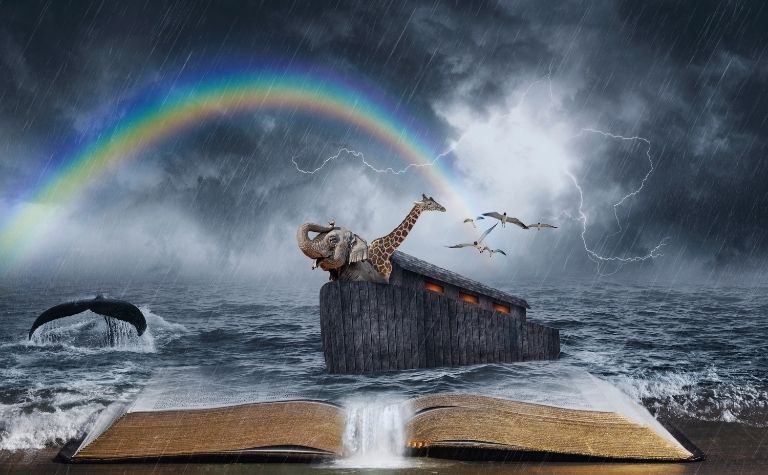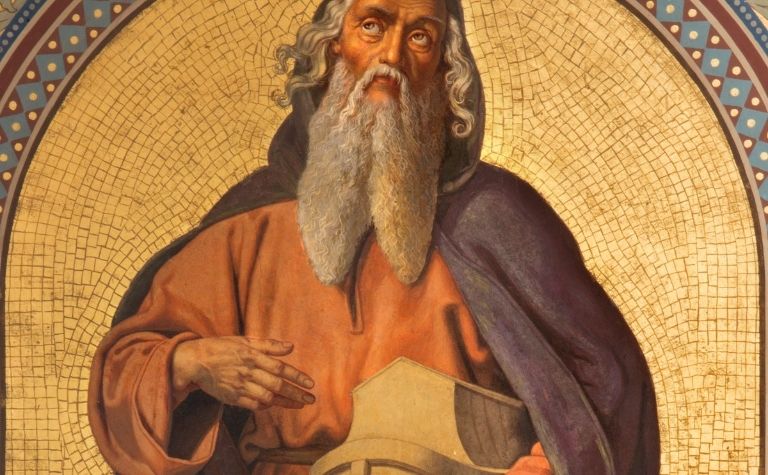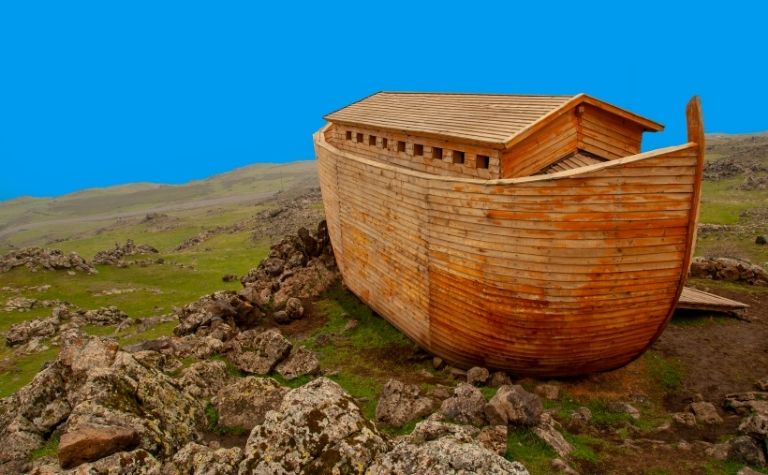In the first chapter of Genesis, God called the world that he created very good (Gen. 1:31). However, by the sixth chapter, sin had corrupted creation so badly that he decided to destroy it with water (Gen. 6:7, 17). At this time, God told Noah to build an ark to save himself and thousands of animals from the flood. Yet there were other people onboard the ark as well. Who were they?
Eight people were on the ark, according to the books of Genesis and 2 Peter. First, Noah and his wife were on it. Second, Noah’s three sons, Shem, Ham, and Japheth, and each of their wives were onboard. Genesis doesn’t refer to any of the wives by name. And Noah didn’t have grandchildren yet.
Where does the Bible say that Noah’s sons and their wives were onboard the ark? What does the New Testament say about Noah’s family? What does Genesis teach about Shem, Ham, and Japheth? Keep reading to learn the answers to these questions and others.
Also see Which Son of Noah Did Jesus Come From? to learn more.

God told Noah to take his sons on the ark
Genesis only describes Noah as righteous, blameless, and one who walked with God (Gen. 6:9). Yet, God told him to take his sons and their wives with him on the ark. “Go into the ark, you and all your household, for I have seen that you are righteous before me in this generation” (Gen. 7:1). Genesis mentions Noah’s sons and their wives multiple times in the flood story.
When floodwater began covering the world, Noah’s family boarded the ark. This time, Genesis mentions Noah’s sons’ names and their wives. “On the very same day Noah and his sons, Shem and Ham and Japheth, and Noah’s wife and the three wives of his sons with them entered the ark” (Gen. 7:13). The Bible never mentions the names of Shem, Ham, and Japheth’s wives.
The flood story mentions Noah’s family again in its description of God destroying life on the earth. “He blotted out every living thing that was on the face of the ground, man and animals and creeping things and birds of the heavens. They were blotted out from the earth. Only Noah was left, and those who were with him in the ark” (Gen. 7:23).
After the floodwaters dried, Genesis says that Noah’s family left the ark with him. “Go out from the ark, you and your wife, and your sons and your sons’ wives with you” (Gen. 8:16).
Does the New Testament mention Noah’s family?
Peter mentions that there were seven other people on the ark with Noah, corroborating the flood story in Genesis. He writes, “If [God] did not spare the ancient world, but preserved Noah, a herald of righteousness, with seven others, when he brought a flood upon the world of the ungodly” (2 Pet. 2:5).
Also see Who Helped Noah Build the Ark? to learn more.

What does Genesis say about Shem?
Shem was the second son of Noah. Genesis implies that he was 98 years old when the flood occurred. “These are the generations of Shem. When Shem was 100 years old, he fathered Arpachshad two years after the flood” (Gen. 11:10).
After he fathered Arpachshad, Shem lived another 500 years before he died at the age of 600. “And Shem lived after he fathered Arpachshad 500 years and had other sons and daughters” (Gen. 11:11).
The family line of Shem
In his prophecy regarding future generations, Noah revealed that Japheth’s descendants would live in the tents of Shem, while the Canaanites of Ham’s line wouldn’t.
Genesis 9:25-27 read, “Cursed be Canaan; a servant of servants shall he be to his brothers. He also said, Blessed be the Lord, the God of Shem; and let Canaan be his servant. May God enlarge Japheth, and let him dwell in the tents of Shem, and let Canaan be his servant.”
The Table of Nations mentions Shem’s descendants. Genesis 10:21-22 read,
- 21 To Shem also, the father of all the children of Eber, the elder brother of Japheth, children were born.
- 22 The sons of Shem: Elam, Asshur, Arpachshad, Lud, and Aram.
- 23 The sons of Aram: Uz, Hul, Gether, and Mash.
- 24 Arpachshad fathered Shelah; and Shelah fathered Eber.
- 25 To Eber were born two sons: the name of the one was Peleg, for in his days the earth was divided, and his brother’s name was Joktan.
- 26 Joktan fathered Almodad, Sheleph, Hazarmaveth, Jerah,
- 27 Hadoram, Uzal, Diklah
- 28 Obal, Abimael, Sheba
- 29 Ophir, Havilah, and Jobab; all these were the sons of Joktan.
- 30 The territory in which they lived extended from Mesha in the direction of Sephar to the hill country of the east.
- 31 These are the sons of Shem, by their clans, their languages, their lands, and their nations.
Also see When Did Noah Build the Ark? to learn more.
What does Genesis say about Japheth?
Genesis refers to Japeth as older than Shem. “To Shem also, the father of all the children of Eber, the elder brother of Japheth, children were born” (Gen. 10:21).
Nevertheless, he appears third in some lists of Noah’s sons, like Genesis 6:10, “And Noah had three sons, Shem, Ham, and Japheth” and 9:18, “The sons of Noah who went forth from the ark were Shem, Ham, and Japheth. (Ham was the father of Canaan).”
Like his brothers, Japheth survived the flood (Gen. 7:7). He also helped Shem cover up Noah’s nakedness after the flood (Gen. 9:20-27).
The family line of Japheth
His descendants lived in the tents of Shem, unlike Ham’s (Gen. 9:27). Scholars believe his descendants occupied the isles of the Gentiles, Hellenes, or Greeks, including Asia Minor and northern Greece (Gen. 10:5). [5] The Table of Nations includes the descendants of Japheth. Genesis 10:2-5 reads:
- 2 The sons of Japheth: Gomer, Magog, Madai, Javan, Tubal, Meshech, and Tiras.
- 3 The sons of Gomer: Ashkenaz, Riphath, and Togarmah.
- 4 The sons of Javan: Elishah, Tarshish, Kittim, and Dodanim.
Verse five reads, “From these the coastland peoples spread in their lands, each with his own language, by their clans, in their nations.”
Also see Why Did God Flood the World? to learn more.

What does Genesis say about Ham?
Ham was Noah’s youngest son. He was probably born about 96 years before the flood. [4] Ham was the father of the Egyptians, Ethiopians, Libyans, and Canaanites.
The Canaanites play an important role in the Old Testament because they resided in the land that God promised Abraham’s descendants. The Canaanites rejected the God of the Israelites, which created problems for centuries.
The Old Testament sometimes uses the name “Ham” as a reference to the Egyptians. For example, Psalm 78:51 reads, “He struck down every firstborn in Egypt, the firstfruits of their strength in the tents of Ham.”
The family line of Ham
The Table of Nations mentions Ham’s descendants. Genesis 10:6-14 reads,
- 6 The sons of Ham: Cush, Egypt, Put, and Canaan.
- 7 The sons of Cush: Seba, Havilah, Sabtah, Raamah, and Sabteca.
- The sons of Raamah: Sheba and Dedan.
- 8 Cush fathered Nimrod; he was the first on earth to be a mighty man.
- 9 He was a mighty hunter before the LORD. Therefore it is said, “Like Nimrod a mighty hunter before the LORD.”
- 10 The beginning of his kingdom was Babel, Erech, Accad, and Calneh, in the land of Shinar.
- 11 From that land he went into Assyria and built Nineveh, Rehoboth-Ir, Calah, and
- 12 Resen between Nineveh and Calah; that is the great city.
- 13 Egypt fathered Ludim, Anamim, Lehabim, Naphtuhim
- 14 Pathrusim, Casluhim (from whom the Philistines came), and Caphtorim.
Also see How Big Was Noah’s Ark? to learn more.
References:
[1] Source
[2] Source
Related Questions
The Book of Enoch has fascinated historians, theologians, and other interested readers for over two millennia. Some call it "1 Enoch," as there are other ancient writings named after the patriarch....
Noah stands out to Bible readers because of the flood story. Yet, he first stood out to God because of his righteousness (Gen. 6:9). The New Testament mentions Noah, along with Abraham, Moses, and...
